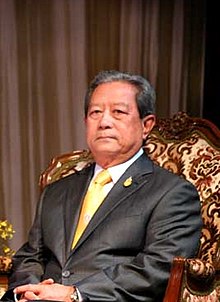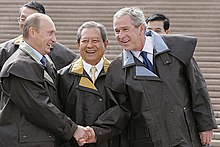Surayud Chulanont
Surayud Chulanont ( Thai สุร ยุทธ จุ ลา นนท์ , RTGS : Surayut Chulanon; pronounced: [ sùʔráʔjút ʨùʔlaːnon ]; born August 28, 1943 in Bangkok ) is a Thai retired general and politician. After the 2006 coup , he was Prime Minister of a military-backed transitional government until 2008 .
From 1998 to 2002 Surayud was Supreme Commander of the Army, from 2002 to 2003 Supreme Commander of the Armed Forces. After his retirement, the king appointed him to the Privy Council . After the coup d'état in September 2006, he resigned from the Privy Council to head a government set up by the military junta (“Council for National Security”) as interim premier. After elections were held in December 2007, Surayud transferred power to an elected government on January 29, 2008 and was reappointed a member of the Privy Council.
life and career
As the son of Lieutenant Colonel of the Army Phayom Chulanont born, attended the elite schools Surayud St. Gabriel and Suankularb Wittayalai . His father quit his job when Surayud was still a boy and was involved in the Communist Party of Thailand (KPT). Surayud, however, attended the Royal Chulachomklao Military Academy . He officially began his military service as a lieutenant in 1965. As a young officer, Surayud led units of the army against KPT cells in northern Thailand led by his father. Towards the end of the Vietnam War , he became an instructor at the Special Forces School in Lop Buri Province . He was then promoted to adjutant to the Army Commander in Chief General Prem Tinsulanonda . In 1992 Surayud became the commander of the Thai special forces.
In 1998, Surayud was appointed Supreme Commander of the Army by Prime Minister Chuan Leekpai of the Democratic Party , who also held the office of Defense Minister. Chuan wanted to reform the military to prevent future interference in politics, as had often happened before in Thailand. When Surayud was appointed, he overlooked several higher generals. Surayud promised to downsize the oversized officer corps, to prevent arms purchases in which private interests were at stake, and to keep the military out of politics. In fact, Surayud failed with this reform program, as other high-ranking generals largely prevented its implementation by delaying tactics until the end of his term in office. Under his command, Thailand took part in United Nations peacekeeping missions for the first time, for example in East Timor . With his predecessor in the office of prime minister, Thaksin Shinawatra , Surayud fell out of favor because of his uncompromising and not very business-friendly way of enforcing the UN trade boycott against Burma . On October 1, 2002 he was promoted to the protocol-wise higher, but in fact less influential post of commander-in-chief of the armed forces. He reached the age limit in 2003 and retired.
After retiring from active military service, he went to the monastery for some time, then King Bhumibol Adulyadej appointed him a member of his privy council . Surayud and the President of the Privy Council, Prem Tinsulanonda , played a key role in promoting General Sonthi Boonyaratglin , who later led the coup, to the position of Army Commander-in-Chief.
General Sonthi overthrew the government of Thaksin Shinawatra in a bloodless military coup on September 19, 2006. Surayud resigned from the Privy Council and was appointed the new prime minister of a "civil" interim government on October 1, 2006 at the suggestion of the military junta . Retired military personnel are formally considered civilians in Thailand. He was considered a compromise candidate who was respected by both military leaders and civil politicians. In the first month of his term in office, he apologized to the Muslims in southern Thailand for the previous government's tough crackdown on the conflict with the separatists . He ended the practice of arbitrarily arresting Muslims suspected of supporting the rebels. Some of the convicts of minor offenses in the conflict have been acquitted or bailed. After initial approval, the polls worsened and general opinion turned against the Surayud government, which was seen as rather inactive and aimless. On January 29, 2008, he was replaced by the government of Samak Sundaravej , whose People's Power Party had won a free election. Then King Bhumibol called him back to the Privy Council.
Individual evidence
- ↑ Pasuk Pongphaichit, Chris Baker : Thaksin. The Business of Politics in Thailand. Nordic Institute of Asian Studies, Copenhagen 2004, p. 180.
- ↑ a b c BBC Profile: Surayud Chulanont
- ^ Southern Thailand. The Impact of the Coup. ( Memento of the original from May 20, 2016 in the Internet Archive ) Info: The archive link was inserted automatically and has not yet been checked. Please check the original and archive link according to the instructions and then remove this notice. (PDF; 932 kB) International Crisis Group Asia Report N ° 129, March 15, 2007, p. I.
Web links
- Kurzbiografie (English)
- History of Thai Prime Ministers
| personal data | |
|---|---|
| SURNAME | Surayud Chulanont |
| ALTERNATIVE NAMES | สุร ยุทธ จุ ลา นนท์ (Thai) |
| BRIEF DESCRIPTION | Thai general and politician |
| DATE OF BIRTH | August 28, 1943 |
| PLACE OF BIRTH | Bangkok , Thailand |

